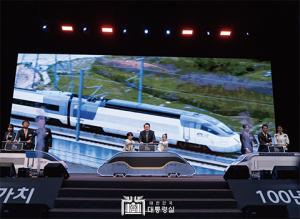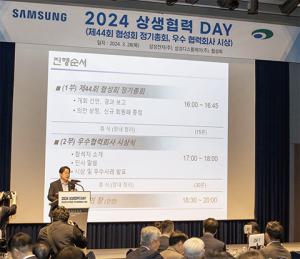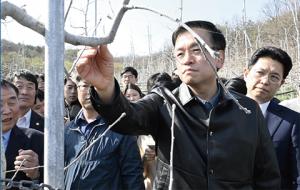 |
||
The Land Owners and Residents Solidarity for Public Housing Development (the solidarity) is an organization that, as of February 2024, involved about 1 million residents of new cities, 89 public housing districts nationwide, and residents and families of expropriated land. In February 2024, the solidarity called for a ‘complete reform of the compulsory land expropriation system’ at the Korea Job World auditorium located in Bundang, Seongnam, Gyeonggi Province, and adopted eight demands sent to President Yoon. The proposal letter points out problems with the land expropriation system and the related law, suggests alternatives, and strongly urges LH to prepare fundamental measures and reform plans. The 8 points are as follows:
 |
The 8 points
1. Completely halt development of forced expropriation method and adding replotting method.
2. Decide on “market value”, such as compensation for expropriated land and disposal of state-owned general property.
3. Set a limit on the timing of land supply and an upper limit on the supply price.
4. Reform the system so that appraisers are selected by a neutral, independent organization.
5. Introduce the ‘owner-recommended appraiser system’ for determining the supply price of livelihood land.
6. Significantly expand the scope to include residents’ livelihood cooperatives and those receiving livelihood measures other than residents.
7. Appoint the ‘Chairman of the Central Land Acquisition Committee’ to a political position.
8. Reduce capital gains tax by 100% on forcibly expropriated land and fundamentally reform the legal system.
In other words, the existing forced land acquisition method should be replaced with a return or use method, and the indigenous peoples should be given a reasonable share of the development benefits, so that the project developer and the indigenous both can win-win.
Yanghyun Jeong, representative attorney at How, a real estate law firm, points out “I think it will help the indigenous people resettle because it gives them more options. The current law requires indigenous peoples to be completely excluded from development interests in land valuation. As a result, they are compensated at amounts that fall far short of market value, and the compensation does not even cover half of the expropriated land. This is far from ‘just compensation’ as guaranteed by the Constitution and should be compensated by determining the price based on ‘market value’.”
 |
We need to set limits on the supply period for land compensation and improve the appraiser system!
Currently, it takes an average of more than three years between the time of land compensation contract and the time of supply. As a result, the appraised price at the time of supply has increased significantly compared to the estimated price announced at the time of the compensation contract, resulting in cases of abandonment of land supply.
Land compensation firm GD Holdings chief lawyer Jeonghoon Lee says “There is no set time frame for land compensation contracts and supply contracts, which can take five to 10 years at a time, creating problems. To solve this problem, supply should be compulsory within three years from the time of the contract, and the estimated price announced at the time of the contract should be estimated as the amount of supply, plus interest, but not to exceed 120% of the original estimated price.”
Solidarity president Chaegwan Im says “Currently, landowners and project developers select land appraisers. This often leads to mutual distrust as they represent only their own interests. We have consistently advocated that the Land Compensation Act should be amended to allow a neutral and independent organization, such as the local council or the Korea Association of Property Appraisers, to select appraisers to prevent these problems.”
Lee says “I think it’s unreasonable that the current situation, where the owner is the one who does the appraisal, publishes the appraisal, and the owner, who is the contracting party, is not involved.”
Im says “In accordance with the principle of just compensation guaranteed by the Constitution, for the sake of balance and equity in the appraisal method, an appraiser recommended by the landowner should be involved in the appraisal process when the supply price of the livelihood measures land is set as the ‘appraised price’.”
 |
Practical support measures for residents!
Fairer system improvements and new capital gains tax cuts!
Currently, LH’s ‘Guidelines for Establishing Livelihood Support for Residents in Public Housing Districts’ limits the ‘scope’ of residents who lose their livelihoods to ‘homeowners’ and ‘tenants’. However, there is no proper support for people who have lost their existing jobs due to the public housing district project, so it is necessary to include them in the scope of support measures and implement practical resident support.
Im says “The Minister of Land, Infrastructure and Transport concurrently serves as chairman of the Central Land Acquisition Committee. To that extent, it is difficult to make decisions independent of the ministry, and the right to compulsory expropriation tends to be overused.”
So the solidarity argues that the Land Compensation Act should be revised to strengthen the role of the Central Land Acquisition Committee and the chairman should be appointed to a political position. Unlike in the past, the capital gains tax upon compulsory expropriation of land is currently only reduced by 10%. In order to eliminate this irrationality, it is necessary to amend the Restriction of Special Taxation Act to provide a 100% reduction in capital gains tax on forcibly expropriated land.
강영훈 기자 kangy423@naver.com







